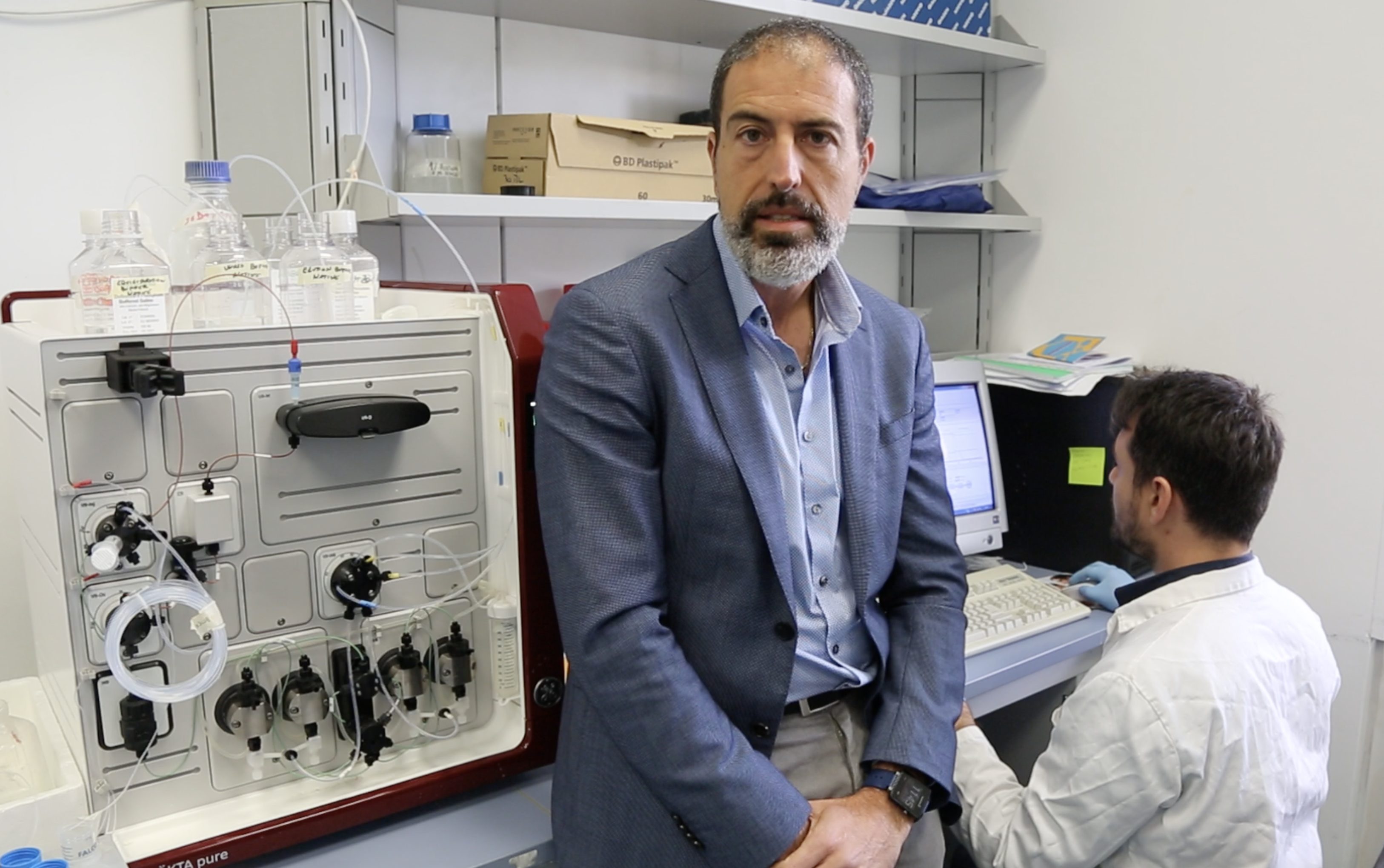IL VACCINO COVID-eVax, BASATO SULLA TECNOLOGIA DEL DNA PROTEGGE DA SARS-CoV-2 IN MODELLI PRECLINICI E FUNZIONA CONTRO LE VARIANTI
16 Giugno 2021 - Takis e Rottapharm Biotech annunciano la sottomissione dei risultati ottenuti nei modelli preclinici con il vaccino COVID-eVax, la caratterizzazione della risposta immunitaria indotta dal e i livelli di protezione da infezione da SARS-CoV-2 ad una importante rivista scientifica.

COVID-eVax è un vaccino innovativo diverso dagli altri approvati o in via di sviluppo ed è il primo in Europa basato sulla piattaforma del DNA, in sinergia con la tecnologia detta ’”elettroporazione”, sviluppata grazie alla collaborazione con l’azienda IGEA di Carpi, che grazie a brevi stimoli elettrici media il passaggio del DNA all’interno delle cellule ed attiva il sistema immunitario. Tra gli importanti vantaggi, il DNA è economico, non ha bisogno di complesse formulazioni, può essere prodotto in larga scala e non ha necessità della catena del freddo.
“Il vaccino COVID-eVax è un vaccino “di precisione” perchè produce solo una porzione specifica della proteina “Spike” fondamentale per l’ingresso del virus nelle nostre cellule. I dati ottenuti indicano un alto livello di sicurezza e potenziale efficacia” ha dichiarato Emanuele Marra, Direttore del dipartimento Malattie Infettive della Takis.
“Gli studi effettuati mostrano che gli anticorpi generati dal vaccino sono in grado di neutralizzare SARS-CoV-2 e le sue varianti più preoccupanti a livelli similari” commenta Giuseppe Roscilli, Direttore del dipartimento di generazione e produzione degli Anticorpi Monoclonali, di Takis.
Lo studio è frutto di una collaborazione internazionale, che vede tra i protagonisti le due aziende italiane che stanno sviluppando COVID-eVax (Takis e Rottapharm Biotech), importanti istituzioni accademiche italiane (Istituto Spallanzani ed Istituto Regina Elena a Roma; INGM e Ospedale San Raffaele a Milano) e straniere (Università di Ulm – Germania; Università di Tel Aviv – Israele; National Infection Service, Public Health England – Regno Unito).
“I dati ottenuti nel modello di topo hACE2, che ha lo stesso recettore dell’uomo e sviluppa una patologia simile, mostrano la protezione dal virus e l’assenza di sintomi respiratori ed effetti clinici dovuti all’infezione da SARS-CoV2”, dichiara Matteo Iannacone, direttore dell’Unità di Dinamica delle Risposte Immunitarie all’Ospedale San Raffaele di Milano e Professore di Patologia Generale all’Università Vita-Salute San Raffaele. “Grazie ad un finanziamento europeo competitivo, i risultati ottenuti nei topi sono stati confermati nel furetto, un modello molto usato per i virus respiratori e predittivo dell’efficacia dei vaccini”, afferma Fabio Palombo, Direttore Area Vaccini contro il Cancro alla Takis. Antonella Conforti, Direttore alla Evvivax, la spinoff veterinaria della Takis, afferma: “stiamo applicando la tecnologia anche in ambito veterinario. Infatti, il SARS-CoV-2 è in grado di infettare diverse specie animali ed è importante prevenire l’insorgenza di nuove varianti con la vaccinazione, ove possibile.”
Sulla base di questi risultati e tanti altri, è iniziato a Marzo uno studio clinico di fase I e II presso centri clinici italiani: l’Ospedale San Gerardo di Monza con l’Università di Milano-Bicocca, l’Istituto Nazionale Tumori IRCCS Pascale di Napoli, l’Istituto Nazionale sulle Malattie Infettive Spallanzani di Roma e il Centro Ricerche Cliniche di Verona, in collaborazione con i laboratori di VisMederi a Siena.
“Lo studio clinico è in corso e ci aspettiamo i primi risultati su sicurezza ed immunogenicità del vaccino per fine Agosto” dichiara Lucio Rovati, Presidente e Direttore Scientifico di Rottapharm Biotech, “Nello scenario attuale, COVID-eVax potrebbe rappresentare un ottimo strumento in Paesi dove non c’è attualmente disponibilità di vaccini o come richiamo della risposta immunitaria nel tempo indotta da altre piattaforme vaccinali.”
“Mai come in questo momento storico, abbiamo capito quanto sia importante la Ricerca Scientifica per combattere la Pandemia ed altre malattie. In Italia abbiamo eccellenti scienziati con eccellenti idee e capacità che vanno opportunamente finanziate per rendere il Paese più competitivo” – continua Iannacone.
“La piattaforma di COVID-eVax, che noi abbiamo denominato X-eVax, dove X sta per antigene “X”, può essere utilizzata per tante altre patologie, tra cui il cancro. Investendo in questo settore tecnologico, potremo in futuro generare in tempi più rapidi nuovi vaccini ma anche terapie geniche innovative in oncologia e altri settori terapeutici”, ha concluso Luigi Aurisicchio, Amministratore e Direttore scientifico della Takis.
Link alla pubblicazione su BioRxiv:
https://www.biorxiv.org/content/10.1101/2021.06.14.448343v1
Per maggiori informazioni:
Dr Luigi Aurisicchio (CEO/CSO)
This email address is being protected from spambots. You need JavaScript enabled to view it.
Dr. Federica Girolami (Business Development, Scientific Liaison and Drug Safety Director)
This email address is being protected from spambots. You need JavaScript enabled to view it.
Takis
Takis è una società biotecnologica creata da un gruppo di scienziati in precedenza di Merck Research Laboratories (MRL). Il gruppo ha più di 15 anni di esperienza e una comprovata competenza nella scoperta di farmaci in Oncologia ed è riconosciuto per l'ideazione e l'implementazione di una serie di tecnologie innovative, tra cui quella della terapia genica con il DNA. Una delle risorse principali di Takis è l’esperienza con l’elettroporazione, una tecnologia che può essere utilizzata per una varietà di applicazioni clinicamente utili, dallo sviluppo di vaccini alla terapia genica somatica. La pipeline della Takis include quattro candidati vaccini contro il cancro basati su questa tecnologia. Takis è anche attivamente coinvolta nella generazione di anticorpi monoclonali umanizzati per l'uso in oncologia e in malattie infettive, tra cui COVID-19.
Per ulteriori informazioni sulla società, visitare il sito www.takisbiotech.it
Rottapharm Biotech
Rottapharm Biotech è una società di ricerca dedicata alla scoperta e allo sviluppo di farmaci innovativi. Le competenze in ricerca e sviluppo comprendono la chimica medicinale/computazionale per le piccole molecole, una piattaforma proprietaria per la generazione e selezione di nuovi anticorpi monoclonali e lo sviluppo di altri farmaci biologici e terapie avanzate, la validazione di nuovi target molecolari, la caratterizzazione farmacologica, farmacocinetica, tossicologica e di tecnica farmaceutica di nuovi candidati a farmaci, la progettazione e la conduzione di studi clinici innovativi. La strategia aziendale è quella di sviluppare la propria pipeline in autonomia per poi cercare partnerships con aziende farmaceutiche, oltre a investire in alleanze su progetti innovativi di altre società biotech o spin-off universitari.
Per ulteriori informazioni sulla società, visitare il sito www.rottapharmbiotech.com




